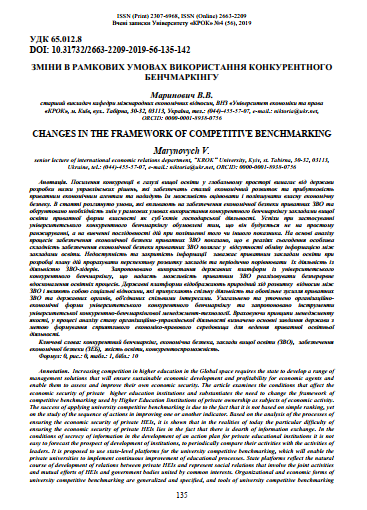CHANGES IN THE FRAMEWORK OF COMPETITIVE BENCHMARKING
DOI:
https://doi.org/10.31732/2663-2209-2019-56-135-142Keywords:
competitive benchmarking, economic security, higher educational institutions, economic security ensuring, quality of education, competitivenessAbstract
Increasing competition in higher education in the Global space requires the state to develop a range of management solutions that will ensure sustainable economic development and profitability for economic agents and enable them to assess and improve their own economic security. The article examines the conditions that affect the economic security of private higher education institutions and substantiates the need to change the framework of competitive benchmarking used by Higher Education Iinstitutions of private ownership as subjects of economic activity. The success of applying university competitive benchmarking is due to the fact that it is not based on simple ranking, yet on the study of the sequence of actions in improving one or another indicator. Based on the analysis of the processes of ensuring the economic security of private HEIs, it is shown that in the realities of today the particular difficulty of ensuring the economic security of private HEIs lies in the fact that there is dearth of information exchange. In the conditions of secrecy of information in the development of an action plan for private educational institutions it is not easy to forecast the prospect of development of institutions, to periodically compare their activities with the activities of leaders. It is proposed to use state-level platforms for the university competitive benchmarking, which will enable the private universities to implement continuous improvement of educational processes. State platforms reflect the natural course of development of relations between private HEIs and represent social relations that involve the joint activities and mutual efforts of HEIs and government bodies united by common interests. Organizational and economic forms of university competitive benchmarking are generalized and specified, and tools of university competitive benchmarking management technology are proposed. Taking into account the principles of quality management, in the process of analyzing the state of organizational and managerial activity the main tasks of the state have been identified in order to create a favorable economic and legal environment for private educational activities.
Downloads
References
Денисенко М. П., Бреус С. В., Грищенко І. А. Конкурентоспроможність української вищої освіти в європейському просторі та можливості доступу до неї соціально незахищених верств населення. Освіта: соціальні проблеми в контексті економічного розвитку України. 2014. С. 104.
Фініков Т. В., Терещук В. І. Локальні системи управління якістю: світовий досвід та українські практики побудови : навчальний посібник. Київ : Таксон, 2018. 316 с.
Kasych A., Breus S., Khaustova Y. The Economic Security of Higher Educational Institutions from the Perspective of International Competition . Baltic Journal of Economic Studies. 2018. Vol.4 (No. 5).
World Development Indicators. World Data Bank. URL : http://databank.worldbank.org/data/reports.aspx?source=world-development-indicators.
KI and KEI Indexes. The World Bank. URL: http://go.worldbank.org/SDDP3I1T40.
The Human Capital Report. 2015. URL: http://weforum.org/reports/human-capital-report-2015
Effective Innovation Policies for Development. The Global Innovation Index. 2015. URL : http://www.globalinnovationindex.org/content/page/Gll-Home.
Закон України «Про вищу освіту» від 01.07.2014 р. № 1556-VII. URL : http://zakon2.rada.gov.ua/laws/show/1556-18.
Education Sector Risk assessment : Asian Development Bank. Guidance Note. 2010. 29 p.
Стратегія реформування вищої освіти в Україні до 2020 року (проект). Концептуальна записка. URL : http://tnpu.edu.ua/EKTS/strate2014.pdf.


